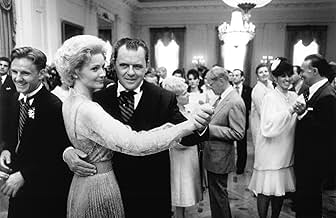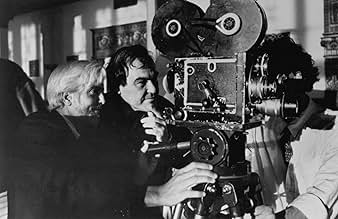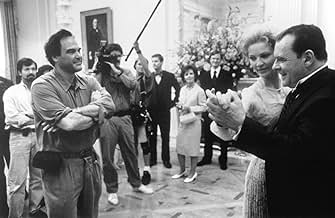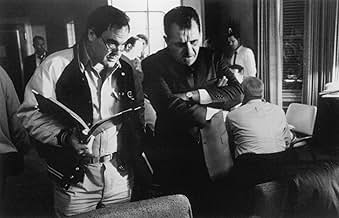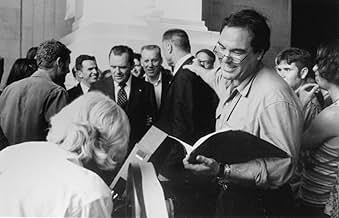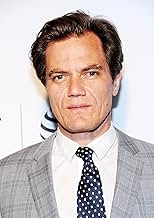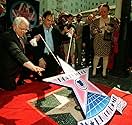IMDb रेटिंग
7.0/10
34 हज़ार
आपकी रेटिंग
अपनी भाषा में प्लॉट जोड़ेंA biographical story of former U.S. President Richard Nixon, from his days as a young boy, to his eventual Presidency, which ended in shame.A biographical story of former U.S. President Richard Nixon, from his days as a young boy, to his eventual Presidency, which ended in shame.A biographical story of former U.S. President Richard Nixon, from his days as a young boy, to his eventual Presidency, which ended in shame.
- निर्देशक
- लेखक
- स्टार
- 4 ऑस्कर के लिए नामांकित
- 11 जीत और कुल 18 नामांकन
फ़ीचर्ड समीक्षाएं
Hopkins is remarkable as Nixon. Wisely not even trying for an exact likeness, his interpretation of that so-familiar physicality is uncannily evocative. From the very start, the characterisation is spot-on - the jut of the lower jaw, the growly voice, the rounded shoulders. Once the viewer has adjusted to the initial shock, Hopkins IS Nixon. It ceases to be an issue.
Theodore Roosevelt, Washington, Kennedy and (most of all) Lincoln look down from the White House walls at Nixon, their solemn portraits hovering like admonishing ghosts over the Watergate squalor. In life, Roosevelt was bold and self-assured, whereas Nixon dithers: Washington's self-effacing propriety confronts a Nixon who is suggesting that the Nazis were right. Kennedy is everything that Nixon could never be - above all else, at ease with himself. Lincoln looks down, from the office wall and from his marble seat in the Memorial, in silent rebuke as his successor debases the presidency.
Some of the camera tricks don't work. We see Nixon rooted to the spot at Love Field as the camera soars up and away from him. Why? Obtrusive camera movement is justified only if it adds to our understanding of character or plot. This shot seems to have been included merely for its cleverness. The same is true of the little flashes of black-and-white which keep interrupting the action. At one point, in a dialogue between Nixon and Haldeman, the focus is un-subtly and repeatedly thrown from one man to the other. What does this achieve? Is some artistic goal being pursued, or are the effects included for their own sake? What is the symbolic importance (if any) of the vanishing racehorses?
Much of the attention to detail is of a very high order. Stone's writing team has done its homework, and we get authentic touches such as Nixon's love of log fires, which meant having to run the White House air conditioning system at full blast during summer. The reconstructions of the White House interiors are superb. We see Nixon and Pat engaging in a domestic scrap beneath murals of more edifying battles like Yorktown and Saratoga. Historical events, recorded on news film at the time, are brilliantly reconstituted, replacing the real Nixon with the Hopkins version. Thus we get convincing reconstructions of the Kennedy TV debate and the 1962 'retirement' speech. Young Nixon's courtship of Pat is narrated without dialogue as a grainy, jumpy home movie - and is beautifully done. I did not feel quite so positive about the Alger Hiss segment. Welles did this 'newsreel flashback' idea in "Citizen Kane" more than half a century earlier, and did it with such flair that anything which follows is sure to look jaded. It also seemed to me that this passage is badly-placed, coming immediately after the 1962 California defeat.
James Wood plays Bob Haldeman, and does his usual admirable, photogenic best. My quibble with the characterisation is, this isn't THE Haldeman. The historical personage was grimmer, more stately, more formidable (Fred Emery's "Watergate" bears this out). Wood is restricted here to the role of an aide, rather than the Chief of the White House Staff, an emperor within his own (not inconsiderable) domain.
Pat Nixon does not ring true either, but for different reasons. Joan Allen is more than competent as the steely, astute power behind the Nixon throne. The fault is in the characterisation rather than the actor. The real Pat was (so far as one can judge) an altogether less articulate, less philosophical, less knowing individual. Watch her in the REAL "Checkers" broadcast - she is a stiff, repressed, passive woman, a true 1950's Republican wife, not the power broker that this film would have us believe. It is hard to accept, for example, that Nixon's decision to retire in 1962 was his wife's diktat.
There are elements of this otherwise excellent film which simply don't work. Would the President of the United States REALLY be pulled out of a face-to-face meeting with Brezhnev to deal with some Watergate minutiae? The real-life Mitchell said that he tolerated Martha's indiscretions "because I love her". This touching declaration is cheapened in the film, for no good reason. Similarly, Tricia Nixon's exchange with her father was, in real life, an assertion of unconditional loyalty which was both moving and very much to Nixon's credit. The film version has her asking sceptically, "Did you cover up?" This is quite wrong. The Nixon women would have considered it treachery even to frame such a question.
John Williams' epic score is in keeping with the classical tragedy acted out before us. Nixon's tearful prayer with Kissinger and the farewell speech to the White House staff are scenes of extraordinary power.
Paul Sorvino gives us a marvellous Kissinger, though in my humble opinion Stone goes too far when he makes Kissinger the White House 'leaker' and accuses the Secretary of State of complicity in the Watergate break-ins.
One scene which works splendidly is the (true) incident at the Lincoln Memorial. Nixon tries to glad-hand the indignant youngsters, using the hearty, patronising approach of a bygone generation. The sad revulsion of the protesters shows the gulf between Nixon's consciousness and the spirit of the age.
"I hope I haven't let you down" is uttered one single time by Nixon, towards the end of the film. The truth is, he hit on this formula of words and used it again and again during the final days of his presidency. It was a last desperate attempt to tweak our sympathy-nodes. As such, it was utterly gauche, utterly craven, utterly guileful, yet utterly unrealistic. In fact, utterly Nixon.
Theodore Roosevelt, Washington, Kennedy and (most of all) Lincoln look down from the White House walls at Nixon, their solemn portraits hovering like admonishing ghosts over the Watergate squalor. In life, Roosevelt was bold and self-assured, whereas Nixon dithers: Washington's self-effacing propriety confronts a Nixon who is suggesting that the Nazis were right. Kennedy is everything that Nixon could never be - above all else, at ease with himself. Lincoln looks down, from the office wall and from his marble seat in the Memorial, in silent rebuke as his successor debases the presidency.
Some of the camera tricks don't work. We see Nixon rooted to the spot at Love Field as the camera soars up and away from him. Why? Obtrusive camera movement is justified only if it adds to our understanding of character or plot. This shot seems to have been included merely for its cleverness. The same is true of the little flashes of black-and-white which keep interrupting the action. At one point, in a dialogue between Nixon and Haldeman, the focus is un-subtly and repeatedly thrown from one man to the other. What does this achieve? Is some artistic goal being pursued, or are the effects included for their own sake? What is the symbolic importance (if any) of the vanishing racehorses?
Much of the attention to detail is of a very high order. Stone's writing team has done its homework, and we get authentic touches such as Nixon's love of log fires, which meant having to run the White House air conditioning system at full blast during summer. The reconstructions of the White House interiors are superb. We see Nixon and Pat engaging in a domestic scrap beneath murals of more edifying battles like Yorktown and Saratoga. Historical events, recorded on news film at the time, are brilliantly reconstituted, replacing the real Nixon with the Hopkins version. Thus we get convincing reconstructions of the Kennedy TV debate and the 1962 'retirement' speech. Young Nixon's courtship of Pat is narrated without dialogue as a grainy, jumpy home movie - and is beautifully done. I did not feel quite so positive about the Alger Hiss segment. Welles did this 'newsreel flashback' idea in "Citizen Kane" more than half a century earlier, and did it with such flair that anything which follows is sure to look jaded. It also seemed to me that this passage is badly-placed, coming immediately after the 1962 California defeat.
James Wood plays Bob Haldeman, and does his usual admirable, photogenic best. My quibble with the characterisation is, this isn't THE Haldeman. The historical personage was grimmer, more stately, more formidable (Fred Emery's "Watergate" bears this out). Wood is restricted here to the role of an aide, rather than the Chief of the White House Staff, an emperor within his own (not inconsiderable) domain.
Pat Nixon does not ring true either, but for different reasons. Joan Allen is more than competent as the steely, astute power behind the Nixon throne. The fault is in the characterisation rather than the actor. The real Pat was (so far as one can judge) an altogether less articulate, less philosophical, less knowing individual. Watch her in the REAL "Checkers" broadcast - she is a stiff, repressed, passive woman, a true 1950's Republican wife, not the power broker that this film would have us believe. It is hard to accept, for example, that Nixon's decision to retire in 1962 was his wife's diktat.
There are elements of this otherwise excellent film which simply don't work. Would the President of the United States REALLY be pulled out of a face-to-face meeting with Brezhnev to deal with some Watergate minutiae? The real-life Mitchell said that he tolerated Martha's indiscretions "because I love her". This touching declaration is cheapened in the film, for no good reason. Similarly, Tricia Nixon's exchange with her father was, in real life, an assertion of unconditional loyalty which was both moving and very much to Nixon's credit. The film version has her asking sceptically, "Did you cover up?" This is quite wrong. The Nixon women would have considered it treachery even to frame such a question.
John Williams' epic score is in keeping with the classical tragedy acted out before us. Nixon's tearful prayer with Kissinger and the farewell speech to the White House staff are scenes of extraordinary power.
Paul Sorvino gives us a marvellous Kissinger, though in my humble opinion Stone goes too far when he makes Kissinger the White House 'leaker' and accuses the Secretary of State of complicity in the Watergate break-ins.
One scene which works splendidly is the (true) incident at the Lincoln Memorial. Nixon tries to glad-hand the indignant youngsters, using the hearty, patronising approach of a bygone generation. The sad revulsion of the protesters shows the gulf between Nixon's consciousness and the spirit of the age.
"I hope I haven't let you down" is uttered one single time by Nixon, towards the end of the film. The truth is, he hit on this formula of words and used it again and again during the final days of his presidency. It was a last desperate attempt to tweak our sympathy-nodes. As such, it was utterly gauche, utterly craven, utterly guileful, yet utterly unrealistic. In fact, utterly Nixon.
Anthony Hopkins does not merely portray Richard Nixon as a cheap caricature, as Frank Langella did in Ron Howard's pointless Frost/Nixon. He creates a living, breathing human being that we can all relate to, while still adopting the notorious president's signature speech patterns and mannerisms.
Oliver Stone's direction is nothing short of a miracle. As in his 1991 masterpiece, JFK, he has a lot of different characters to bring to life on the screen. He helps his actors fashion their performances with miraculous accuracy. Paul Sorvino is dead-on as Henry Kissinger, as is Joan Allen as Pat Nixon, and Bob Hoskins as the mysterious, mean-spirited J. Edgar Hoover.
The writing is also represents a triumph. Stone and co. are able to synthesize entire pages of historical prose into digestible chunks of dialogue. Aspiring screenwriters should seriously take note.
Although 1995 also saw the likes of Casino, Seven, Heat, and The Usual Suspects, Nixon is the ultimate champion. History on screen has rarely been this exhilarating.
Oliver Stone's direction is nothing short of a miracle. As in his 1991 masterpiece, JFK, he has a lot of different characters to bring to life on the screen. He helps his actors fashion their performances with miraculous accuracy. Paul Sorvino is dead-on as Henry Kissinger, as is Joan Allen as Pat Nixon, and Bob Hoskins as the mysterious, mean-spirited J. Edgar Hoover.
The writing is also represents a triumph. Stone and co. are able to synthesize entire pages of historical prose into digestible chunks of dialogue. Aspiring screenwriters should seriously take note.
Although 1995 also saw the likes of Casino, Seven, Heat, and The Usual Suspects, Nixon is the ultimate champion. History on screen has rarely been this exhilarating.
In an overall solid cast, Anthony Hopkins shines in a powerful performance as Richard Nixon in this Oliver Stone film tracing the former president's life from his boyhood in California to his resignation as U.S. President in 1974.
Nixon is seen as a troubled figure, insecure and paranoid, with few friends. An unhappy childhood, in which he refers to himself as his mother's "faithful dog," in fact does dog him his whole life, as he seeks to please a demanding ultra-religious mother (Mary Steenburgen)who had already died by the time he took office as President, but whose memory and expectations lived on. Nixon is burdened with an unhappy marriage to Pat (Joan Allen) - unhappy largely because of his own obsession with political success - and haunted by the ghost of John Kennedy, who defeated him for the presidency in 1960 and who Nixon could never live up to. Kennedy was loved; Nixon was hated - he could never get over that. A scene near the end of the movie demonstrates his feelings toward JFK as he looks at Kennedy's White House portrait: "They look at you and see what they want to be; they look at me and see who they are."
Although the movie - as any review of Nixon's life will - revolves around Watergate, it provides a fascinating summary of his life, and of what added up to make him the troubled and lonely figure he really was. There's also typical Oliver Stone material as dark hints of conspiracy extending far beyond Watergate are inserted. Perhaps the most unsettling being a meeting Nixon has shortly before JFK's assassination with some supporters in Texas who are trying to convince him to run for the presidency again in 1964. Nixon protests that Kennedy can't be beaten in '64. A Cuban American present says ominously "What if Kennedy doesn't run in '64?"
A truly fascinating portrayal of a fascinating man, even in the end somewhat sympathetic to Nixon as the film ends with his 1994 funeral service, some comments at that service by President Clinton and a summary of his career by a narrator pointing out his accomplishments. A last note: kudos to Paul Sorvino, who hit Henry Kissinger bang on.
8/10
Nixon is seen as a troubled figure, insecure and paranoid, with few friends. An unhappy childhood, in which he refers to himself as his mother's "faithful dog," in fact does dog him his whole life, as he seeks to please a demanding ultra-religious mother (Mary Steenburgen)who had already died by the time he took office as President, but whose memory and expectations lived on. Nixon is burdened with an unhappy marriage to Pat (Joan Allen) - unhappy largely because of his own obsession with political success - and haunted by the ghost of John Kennedy, who defeated him for the presidency in 1960 and who Nixon could never live up to. Kennedy was loved; Nixon was hated - he could never get over that. A scene near the end of the movie demonstrates his feelings toward JFK as he looks at Kennedy's White House portrait: "They look at you and see what they want to be; they look at me and see who they are."
Although the movie - as any review of Nixon's life will - revolves around Watergate, it provides a fascinating summary of his life, and of what added up to make him the troubled and lonely figure he really was. There's also typical Oliver Stone material as dark hints of conspiracy extending far beyond Watergate are inserted. Perhaps the most unsettling being a meeting Nixon has shortly before JFK's assassination with some supporters in Texas who are trying to convince him to run for the presidency again in 1964. Nixon protests that Kennedy can't be beaten in '64. A Cuban American present says ominously "What if Kennedy doesn't run in '64?"
A truly fascinating portrayal of a fascinating man, even in the end somewhat sympathetic to Nixon as the film ends with his 1994 funeral service, some comments at that service by President Clinton and a summary of his career by a narrator pointing out his accomplishments. A last note: kudos to Paul Sorvino, who hit Henry Kissinger bang on.
8/10
Richard Nixon is one of the most controversial heads of state of the twentieth century. During his tenure as president of the United States, he earned a general hatred almost as high as the power and influence of his office. He was investigated, vilified, attacked but never condemned. Even though I'm not an American nor an expert of these period, I feel it is necessary to make an unbiased and objective historical analysis of this president, I just don't know if that has already happened. Even so, the film we have here didn't seem partial, trying to remain neutral to some extent.
Directed by Oliver Stone, it's not appropriate for people who don't know anything about Nixon, or Watergate, or this period of American history, since the film wasn't wasting time explaining anything. So if you didn't understand why Nixon opened the US to China or what was the Watergate or the Bay of Pigs, I suggest you ignore the movie for now and first go read some books or see some documentaries about it. Another problem I want to highlight is the huge web of conspiracies and obscure theories that the film weaves around the president. It never lets us understand what "crimes of responsibility" Nixon has committed. The film also suggests, without subtleties, that Nixon was a simple man who rose in life but wasn't accepted by the "American aristocracy" because of this humble origin, which left him deeply hurt. I don't know if it's true, but the film indicates that as origin of President's lack of scruples.
Anthony Hopkins assures the main role in an interesting performance, but that's far from being his best. He made a good preparation and tried his best to be Nixon, but has few physical similarities with him, not to mention his extreme difficulty in imitating president's characteristic voice. Anyway, Hopkins was brilliant at his character's psychological work, with most dramatic scenes going on as he, semi-drunk, reviews his decisions while listening to his famous audio tapes. The remaining cast does a reasonable supporting work. I will not close my review without left a word of appreciation to the sets and costumes, which rebuilt the atmosphere and culture of the Seventies quite well, much like the rooms and offices within White House. Not being exceptional, it's an elegant, quality film, that helps us think about an important period in American history.
Directed by Oliver Stone, it's not appropriate for people who don't know anything about Nixon, or Watergate, or this period of American history, since the film wasn't wasting time explaining anything. So if you didn't understand why Nixon opened the US to China or what was the Watergate or the Bay of Pigs, I suggest you ignore the movie for now and first go read some books or see some documentaries about it. Another problem I want to highlight is the huge web of conspiracies and obscure theories that the film weaves around the president. It never lets us understand what "crimes of responsibility" Nixon has committed. The film also suggests, without subtleties, that Nixon was a simple man who rose in life but wasn't accepted by the "American aristocracy" because of this humble origin, which left him deeply hurt. I don't know if it's true, but the film indicates that as origin of President's lack of scruples.
Anthony Hopkins assures the main role in an interesting performance, but that's far from being his best. He made a good preparation and tried his best to be Nixon, but has few physical similarities with him, not to mention his extreme difficulty in imitating president's characteristic voice. Anyway, Hopkins was brilliant at his character's psychological work, with most dramatic scenes going on as he, semi-drunk, reviews his decisions while listening to his famous audio tapes. The remaining cast does a reasonable supporting work. I will not close my review without left a word of appreciation to the sets and costumes, which rebuilt the atmosphere and culture of the Seventies quite well, much like the rooms and offices within White House. Not being exceptional, it's an elegant, quality film, that helps us think about an important period in American history.
This is a scary one. A merciless look into the pathology of one weird bloke. Anthony Hopkins may not look like Nixon but he does the role to perfection. It is truly scary.
Great cast. Hopkins is a hard working star. What a shame he lost to the Hoffman aper Cage. And Nixon? What a loser. What a terrible insufferable tragic loser. It surely was a challenge to do this for Hopkins.
The biggest most significant detriment is of course one knows not where fact ends and fiction begins. Stone doesn't exactly have a reputation for avoiding hyperbole.
But taken as a personality portrait it's devastating. You might know your history but you've probably never imagined things were like this. You could have imagined them if you'd taken the time, but this movie brings you there.
It's just a tragic movie about an extraordinarily tragic figure. Stone brought you Salvador where he showed how well he knows the art of movie making; he brought you the screenplay for Scarface; and so forth. He can do it, whether or not he goes too far on some occasions. The movie production itself is very good.
And it's a long one. It's not a popcorn movie. It's extremely depressing and frightful. A look into one very weird pathology. But a 7 out of 10 is not out of order.
Great cast. Hopkins is a hard working star. What a shame he lost to the Hoffman aper Cage. And Nixon? What a loser. What a terrible insufferable tragic loser. It surely was a challenge to do this for Hopkins.
The biggest most significant detriment is of course one knows not where fact ends and fiction begins. Stone doesn't exactly have a reputation for avoiding hyperbole.
But taken as a personality portrait it's devastating. You might know your history but you've probably never imagined things were like this. You could have imagined them if you'd taken the time, but this movie brings you there.
It's just a tragic movie about an extraordinarily tragic figure. Stone brought you Salvador where he showed how well he knows the art of movie making; he brought you the screenplay for Scarface; and so forth. He can do it, whether or not he goes too far on some occasions. The movie production itself is very good.
And it's a long one. It's not a popcorn movie. It's extremely depressing and frightful. A look into one very weird pathology. But a 7 out of 10 is not out of order.
क्या आपको पता है
- ट्रिवियाTo gain the feel of Richard Nixon, Sir Anthony Hopkins watched on tape almost every speech Nixon ever made several times. He also met some people who knew Nixon and could lend Hopkins some insight on him.
- गूफ़The film shows Nixon signing his resignation letter the day before he leaves office and prior to it being publicly announced. Historically, Nixon informed the nation in an address the night before leaving office, and then signed the letter the next day, which was his last morning in the White House.
- भाव
Richard M. Nixon: [to a portrait of Kennedy] When they look at you, they see what they want to be. When they look at me, they see what they are.
- क्रेज़ी क्रेडिटSecond opening credits: "For what is a man profited, if he shall gain the whole world, and lose his own soul?" Matthew 16:26.
- इसके अलावा अन्य वर्जनLetterbox video version features additional outtake footage, including a scene starring Sam Waterston as CIA director Richard Helms.
- साउंडट्रैकMenuetto
from Schubert's "Symphony No. 2 in B Flat Major, D 125"
Written by Franz Schubert
Performed by Koninklijk Concertgebouworkest (as Royal Concertgebouw Orchestra)
Nikolaus Harnoncourt, Conductor
Courtesy of Teldec Classics International GmbH
By arrangement with Warner Special Products
टॉप पसंद
रेटिंग देने के लिए साइन-इन करें और वैयक्तिकृत सुझावों के लिए वॉचलिस्ट करें
- How long is Nixon?Alexa द्वारा संचालित
विवरण
- रिलीज़ की तारीख़
- कंट्री ऑफ़ ओरिजिन
- भाषाएं
- इस रूप में भी जाना जाता है
- Ніксон
- फ़िल्माने की जगहें
- Mission Inn - 3649 Mission Inn Avenue, रिवरसाइड, कैलिफोर्निया, संयुक्त राज्य अमेरिका(Press Enterprise newspaper, Sunday, Nov. 23, 2003)
- उत्पादन कंपनियां
- IMDbPro पर और कंपनी क्रेडिट देखें
बॉक्स ऑफ़िस
- बजट
- $4,40,00,000(अनुमानित)
- US और कनाडा में सकल
- $1,36,81,765
- US और कनाडा में पहले सप्ताह में कुल कमाई
- $22,06,506
- 25 दिस॰ 1995
- दुनिया भर में सकल
- $1,36,81,765
- चलने की अवधि
- 3 घं 12 मि(192 min)
- रंग
- ध्वनि मिश्रण
- पक्ष अनुपात
- 2.39 : 1
इस पेज में योगदान दें
किसी बदलाव का सुझाव दें या अनुपलब्ध कॉन्टेंट जोड़ें


